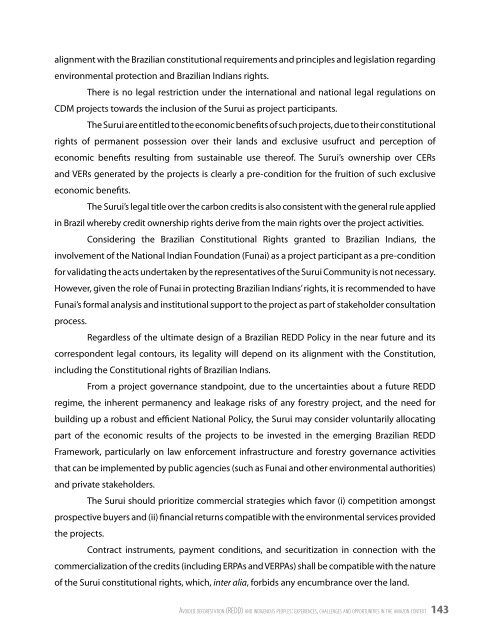Avoided Deforestation (REDD) and Indigenous ... - Amazon Fund
Avoided Deforestation (REDD) and Indigenous ... - Amazon Fund
Avoided Deforestation (REDD) and Indigenous ... - Amazon Fund
You also want an ePaper? Increase the reach of your titles
YUMPU automatically turns print PDFs into web optimized ePapers that Google loves.
alignment with the Brazilian constitutional requirements <strong>and</strong> principles <strong>and</strong> legislation regarding<br />
environmental protection <strong>and</strong> Brazilian Indians rights.<br />
There is no legal restriction under the international <strong>and</strong> national legal regulations on<br />
CDM projects towards the inclusion of the Surui as project participants.<br />
The Surui are entitled to the economic benefits of such projects, due to their constitutional<br />
rights of permanent possession over their l<strong>and</strong>s <strong>and</strong> exclusive usufruct <strong>and</strong> perception of<br />
economic benefits resulting from sustainable use thereof. The Surui’s ownership over CERs<br />
<strong>and</strong> VERs generated by the projects is clearly a pre-condition for the fruition of such exclusive<br />
economic benefits.<br />
The Surui’s legal title over the carbon credits is also consistent with the general rule applied<br />
in Brazil whereby credit ownership rights derive from the main rights over the project activities.<br />
Considering the Brazilian Constitutional Rights granted to Brazilian Indians, the<br />
involvement of the National Indian Foundation (Funai) as a project participant as a pre-condition<br />
for validating the acts undertaken by the representatives of the Surui Community is not necessary.<br />
However, given the role of Funai in protecting Brazilian Indians’ rights, it is recommended to have<br />
Funai’s formal analysis <strong>and</strong> institutional support to the project as part of stakeholder consultation<br />
process.<br />
Regardless of the ultimate design of a Brazilian <strong>REDD</strong> Policy in the near future <strong>and</strong> its<br />
correspondent legal contours, its legality will depend on its alignment with the Constitution,<br />
including the Constitutional rights of Brazilian Indians.<br />
From a project governance st<strong>and</strong>point, due to the uncertainties about a future <strong>REDD</strong><br />
regime, the inherent permanency <strong>and</strong> leakage risks of any forestry project, <strong>and</strong> the need for<br />
building up a robust <strong>and</strong> efficient National Policy, the Surui may consider voluntarily allocating<br />
part of the economic results of the projects to be invested in the emerging Brazilian <strong>REDD</strong><br />
Framework, particularly on law enforcement infrastructure <strong>and</strong> forestry governance activities<br />
that can be implemented by public agencies (such as Funai <strong>and</strong> other environmental authorities)<br />
<strong>and</strong> private stakeholders.<br />
The Surui should prioritize commercial strategies which favor (i) competition amongst<br />
prospective buyers <strong>and</strong> (ii) financial returns compatible with the environmental services provided<br />
the projects.<br />
Contract instruments, payment conditions, <strong>and</strong> securitization in connection with the<br />
commercialization of the credits (including ERPAs <strong>and</strong> VERPAs) shall be compatible with the nature<br />
of the Surui constitutional rights, which, inter alia, forbids any encumbrance over the l<strong>and</strong>.<br />
Av o i d e d d e f o re s t A t i o n (redd) A n d i n d i g e n o u s p e o p l e s: experiences, chAllenges A n d o p p o r t u n i t i e s in t h e A m A zo n c o n t e x t 143
















